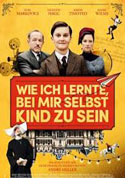

Opening 25 Apr 2019
Directed by:
Rupert Henning
Writing credits:
Uli Brée, Rupert Henning, André Heller
Principal actors:
Valentin Hagg, Karl Markovics, Sabine Timoteo, André Wilms
Paul Silberstein (Valentin Hagg) lives with his affluent family in a prestigious villa in Vienna. His Jewish father, Roman (Karl Markovics), owns a sweets factory, has converted to Catholicism, suffered under the Nazis, and is addicted to opium. His mother Emma copes with this husband while staying in the background. The older brother Johannes (Nikolaas von Schrader) makes plans to work for Uncle Theo in Copenhagen. During school vacation, Paul fails to convince his parents that his Catholic boys’ boarding school is not the right education. Back at school, he squirms under the impaling eyes of the priests, witnesses his comrades suffering physical punishments, and hides in a secret room in the attic where he writes in his diary. His parents teach “Love your father and your mother.” The priests seem to know the entire Bible by heart, which they quote repeatedly. Paul lives by his own Commandment, namely, “I have other plans for myself.” He survives this pressing life by escaping into a fantasy world. He writes love letters to a young girl on a white horse and throws them out the window. But does she really exist? Eventually Paul capitulates to this daily pressure; he lies in bed, refusing to eat or talk. Luckily, his mother rescues him from the boarding school, announcing that “father has died.” At the funeral he meets Uncle Bel, Uncle Monte, and Uncle Lewis, who advise him about life, according to their own experiences: having an orgasm, what really happened during the war, etc. His mother turns into the original merry widow.
Director Rupert Henning adapted this film according to the 2008 book of the same name by André Heller. The title translates to How I Learned to be with my Child Self. Heller intertwined his own life into the fictional story. Heller’s Jewish father manufactured sweets, was wealthy, suffered under the Nazis, and converted to Catholicism. Heller lived in Vienna and went to a Jesuit boarding school. In real life Heller is quite successful as an actor and a musician, as well as an author, which we can appreciate with this film. My colleague reminded me that the film is similar to Hape Kerkling’s portrayal of his own life in Der Junge muss an die Frische Luft. Thinking even further, it reminded me of the children’s film Alfons Zitterbacke: Das Chaos ist zurück, both about young boys coping with life. The actors are tremendous. I especially liked Sabine Timoteo as Emma; she has a small role which jumps off the screen. Naturally Valentin Hagg as Paul is a must-see. Director Henning said, “We met 100 boys at casting, and in the end, Valentin was our wish candidate. He is so special, right on the verge between childhood and adolescence. This is the first time he has ever acted in a film and still he is one of the best actors I’ve ever worked with.” The houses and landscapes carry the atmosphere, beautifully filmed in and around Vienna. (Becky Tan)